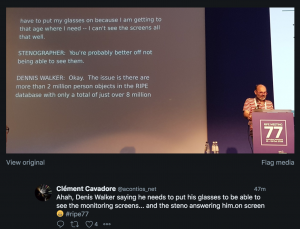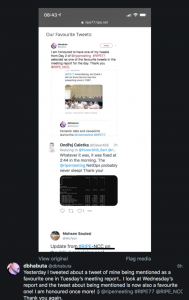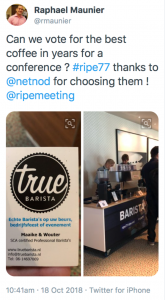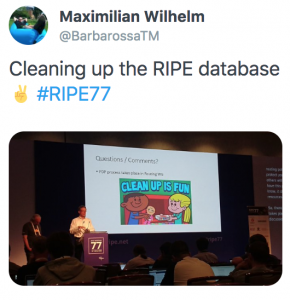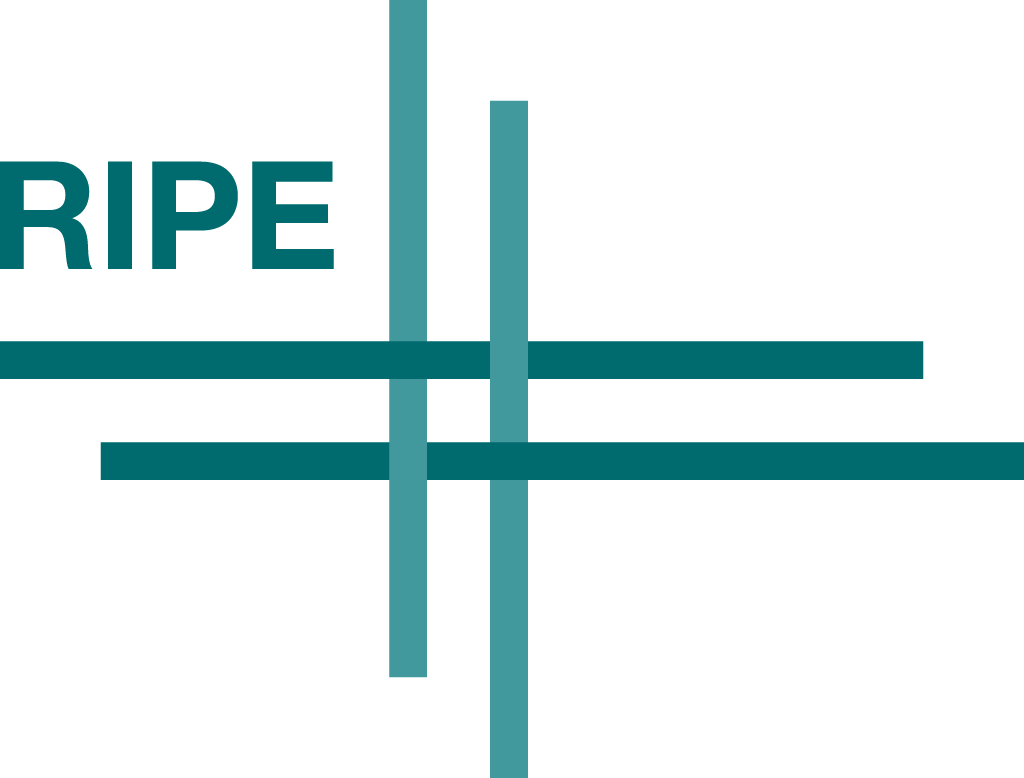Thursday at RIPE 77 kicked off bright and early with eight Working Group sessions lined up on the agenda, some raring to get started, others due to pick up where they had left off earlier in the week. Once again, the number of attendees exceeded anything we’ve seen at previous RIPE Meetings with 790 checked in altogether (225 newcomers).
Here are some highlights from today:
Routing II
- In the first of two talks scheduled for the sessions, Alexander Azimov told us all about ASPA, a simple, scalable method for improving routing security
- We also heard from Florian Hibler who took to the podium to make a case for segment routing
- The session ended with a return to the matter of NON-AUTH objects that dominated a somewhat heated round of questions in the first Routing WG session the day before. Alexander Azimov presented some useful data points he’d gathered on the issue since then, much to the appreciation of the room.
Cooperation
- Chris Buckridge of the RIPE NCC presented on the ITU Plenipotentiary – and received a general sigh of relief from the room that RIPE NCC will be present to provide technical advice.
- Julf Helsingius gets two prizes – first for the most acronyms in a presentation title for giving a talk titled ‘Update on the ICANN EPDP on WHOIS/GDPR’ and the second for sharing a fantastic quote summarising the entire process he spoke about: “We went all the way down the deep, dark rabbit hole, and what we found was not cute fluffy bunnies, but rabbit shit!” ~ Beth Bacon. The only thing we know, he declared, is that the end result will be GDPR compliant.
- Arnold van Rhijn, from the Ministry of Economic Affairs and Climate Policy, Netherlands, gave a presentation based on precisely one slide. EuroDIG will be in the Hague in May 2019.
- Other presentations in this session included cooperation between ETNO and RIPE, talk to Hervé Clement for more details, and Suzanne Taylor from the RIPE NCC shared how EU regulation affects the RIPE community.
IPv6
- WG Co-Chair Jen Linkova gave an update on the IPv6 work taking place in the IETF
- RACI attendee Oliver Gasser dove deep into IPv6 hitlists
- Jens Link stepped back up to give a short and sweet tongue-in-cheek presentation on why we don’t need IPv6
- Benedikt Stockebrand closed the session with a talk entitled “The Art of Running Out of IPv6 Addresses“
Anti-Abuse
- The start of the session saw consensus in practice with the re-election of WG chair Tobias Knecht and the election of a new third co-chair Alireza Vaziri.
- Angela Dall’Ara gave an update on the abuse-c implementation of the policy proposal and by and large people are curious to see how it’s all going to work in the coming months.
- To police or not to police – and that’s not talking about a playlist for a road trip. That was the key question with regard to out of region LIRs and offshore companies with unclear documentation. Carlo Friacas and Dhia Mahjoub both shared very interesting details in their presentations, ‘LIRs from Outside the RIPE NCC Service Region’ and ‘Criminal Abuse in RIPE IP Space’ respectively.
Database
- The session kicked off with an update on the RIPE NCC database looking into NWI-5 and work being done to deal with out of region objects
- Erik Bais, along with Martin Levy, stepped up to talk about cleaning up RIPE-NONAUTH.
- Next, Denis Walker asked why there are so many PERSON objects in the RIPE Database, why there are so very many such objects linked to organisations, and why some organisations have huge amounts of these objects. The RIPE Chair thanked Denis for bringing this to the attention of the WG and the RIPE NCC.
DNS II
- Anand Buddhdev of the RIPE NCC presented an update on switching to a new DNSSEC signer and the upcoming 100Gig site for K-root, while Petr Špaček explained GeoIP + DNSSEC in Knot DNS.
- Benno Overeinder is another strong contender for most acronyms in a presentation title. His talk ‘IETF DNSOP WG Update’ was well received, as was Sara Dickinson’s presentation, ‘Updated Measurements on DNS Privacy’.
Open Source
- A new, upcoming version of the IRRd software was presented, version 4. It is a complete rewrite of IRRd and includes a lot of features that make it very interesting for all network operators.
- It has been an exciting three years for CloudFlare and their network automation using Salt. Many features have been integrated using open source software and there are many more features in the pipeline.
- The Snabb open-source toolkit was presented. It offers network engineers tools for building fast, flexible network functions. Applications range from simple one-off diagnostics to border routers processing traffic for large networks.
- There were two lightning talks: the first about the latest OpenBSD release, which is now at 6.4. The second was the presentation of Routinator 3000, an RPKI Relying party software written in Rust.
IoT
- Security is still the biggest issue when talking about IoT devices. There was a great range of presentations, mostly related to consumer products and their security risks, from security experts from various areas: someone from the IETF homenet WG, two security people from the Dutch police, a security tester/hacker and a researcher. There was a good deal of active participation from the audience and a lot of potential for further collaboration.
- Consensus on the IoT WG chair selection process was sought after an active discussion on the mailing list.
The day ended with a BoF aimed at discussing whether the time has come for a separate working group to deal with issues in data centre management. Then, last but not least, those who had been able to secure a ticket in time climbed aboard for a brief canal cruise over to Amsterdam’s Westerkerk for an evening of organ music at the RIPE Meeting Dinner.
Our Favourite Tweets:
